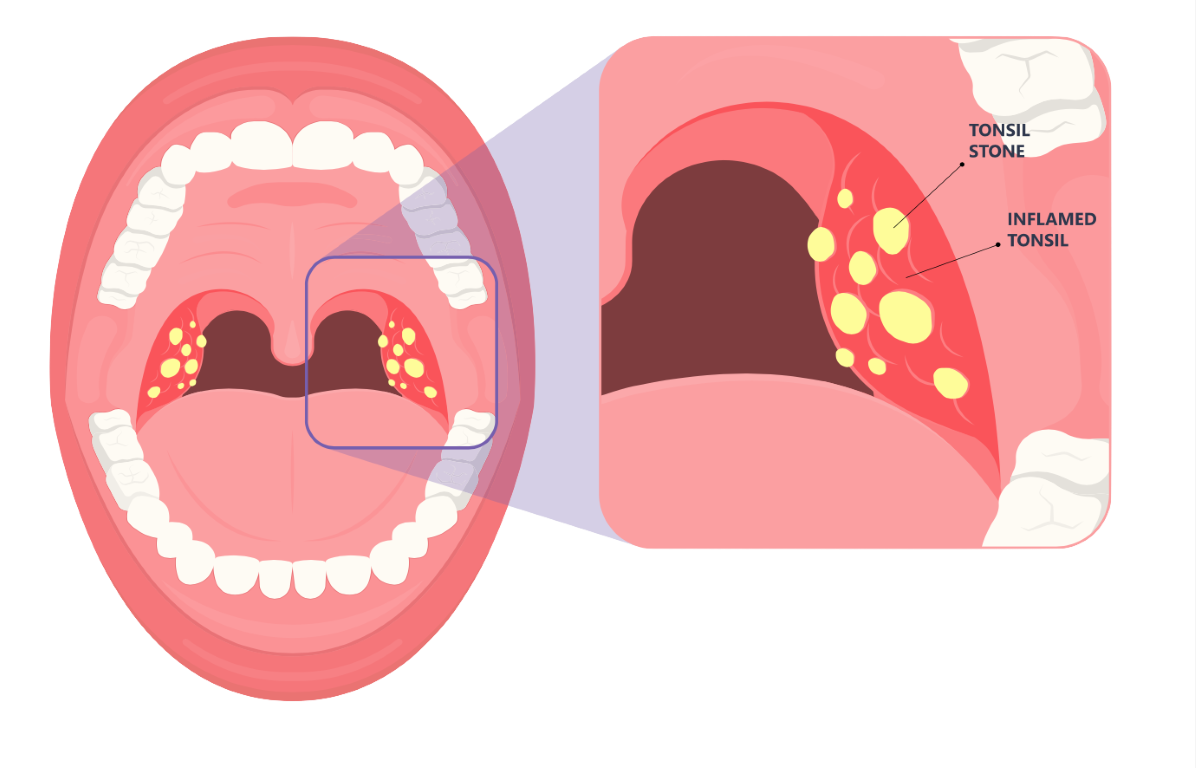Tonsil stones, also called tonsilloliths, are white or yellow stones that are found on a person’s tonsils, those glands at the back of the throat that are actually part of the lymphatic system and help fight infection. Some patients are aware of them, while others don’t know that they have tonsil stones until they come to the Upper Hunt Club Dental Centre in Ottawa for an appointment. Tonsil stones are nearly always benign, but they can cause uncomfortable symptoms and a bad odour.
What Are Tonsil Stones?
Tonsil stones are made out of the debris that’s often found in the mouth, such as bits of food, saliva and dead cells. This debris gets trapped in a person’s tonsil crypts, which are pits and crevices that are found on and in the tonsils. When the debris is trapped there and not washed away, it can harden into a stone. Microorganisms such as bacteria also feed on the debris, which causes the bad smell.
The debris and the microorganisms that feed on it are called biofilm. It is very much like plaque, which is made up of similar debris and can harden into tartar or calculus on the teeth. Complications from tonsil stones are quite rare, but large, chronic stones can lead to abscesses that may need surgery to correct.
Causes of Tonsil Stones
Many tonsil stones are the result of bad oral hygiene. Other things that can predispose a person to tonsil stones are having larger than normal tonsils, tonsils that are continually inflamed and chronic sinusitis. Patients are surprised and relieved to know that tonsil stones aren’t contagious. Most patients who have tonsil stones are teenagers, but anyone who still has their tonsils is susceptible.
Symptoms of Tonsil Stones
Tonsil stones can cause symptoms even if they are tiny and the person can barely see them, though a person is more likely to have symptoms if the tonsil stones are large. Signs and symptoms of tonsil stones can be a sore throat and trouble swallowing. The individual may have bad breath and a cough that won’t go away. It may be surprising to learn that ear pain is a symptom. Ear pain happens because the tonsils and the ears share many of the same nerves. When they open their mouth to check, a person may notice that their tonsils are swollen or have patches of white or yellow on them.
Treatment Options for Tonsil Stones
The best way to prevent tonsil stones or keep them from coming back is good oral hygiene, but tonsilloliths still pester some individuals. It is possible that tonsil stones can go away on their own. But often times, individuals may remove the tonsil stones themselves, especially if they are small. Coughing may loosen and dislodge the stones, as can gargling with salt water. The salt water also soothes the sore throat and removes the bad breath that are two of the symptoms of tonsil stones. Gargling with warm, salty water also changes the chemistry of the mouth and may discourage the stones from forming in the first place. Lastly, tonsil stones can also be removed with water flosser, but this needs to be done gently and with care. It is easy to damage the tonsils with hard or pointed objects, and this damage can lead to infection.
When home remedies are unsuccessful, there are some alternative methods of treatment. One of them is called coblation cryptolysis. This technique uses radio waves to remove the affected tonsil crypts and with them the tonsil stones. Lasers can also be used to remove tonsil crypts, but local anesthesia is needed for this procedure since it uses heat. Another treatment option is antibiotics, since bacteria and other pathogens feed on the debris that makes up the tonsil stones. The problem with antibiotics is that they won’t fix the ultimate cause of the tonsil stone formation such as bad hygiene, and they can only be used for a limited time.
It is recommended that you see your doctor if you find that tonsil stones are reoccurring constantly. Upkeeping strong oral health care practices can help prevent tonsil stones from developing. Visit us at the Upper Hunt Club Dental Centre in Ottawa to check up on your oral health. Contact us today to schedule an appointment.













